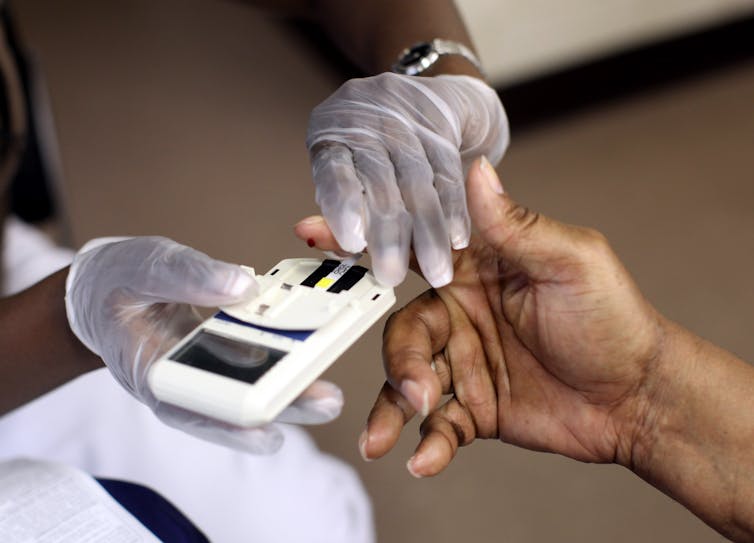
William Balogun, University of Ibadan
Diabetes mellitus, an ancient disease, has now become a global burden. The United Nations in 2006 recognised diabetes as a disease that poses severe risks to families and development goals. In 2019, about 463 million adults were living with diabetes and this is projected to rise to 700 million by 2045. The highest proportion of this increase will be in low- and middle-income countries, including Nigeria.
Scientific progress in medicine has changed the story of diabetes from an incurable disease to a treatable condition. Though the disease itself may not be reversible, its devastating complications can be prevented when effectively treated. People with diabetes can now live much longer.
But because of a lack of resources, many Nigerians living with diabetes are unable to benefit from the fruits of scientific discoveries. They are at risk of premature death or lifelong incapacitation.
Nonetheless, for those that are willing to make lifestyle changes, and can afford and adhere to treatment, they may escape these consequences.
About diabetes
Diabetes is a complex disorder, with different types and subtypes. But all are characterised by high blood sugar arising from insulin deficiency. Insulin is a hormone secreted from the pancreas and normally helps to regulate the level of sugar in the body. With type 2 diabetes, cells or tissues resist the action of insulin. Often, diabetes is accompanied by long-term complications, especially when it has not been well managed.
The most common type of diabetes is type 2. This type accounts for between 80% and 90% of all cases. Others are type 1, secondary diabetes and gestational diabetes. Type 2 diabetes typically occurs from middle age while type 1 tends to occur in children and adolescents. Secondary diabetes is due to specific causes such as drugs, or diseases of the liver or pancreas. This can be reversed once the cause is effectively addressed. Gestational diabetes occurs for the first time in pregnant women.
Both types 1 and 2 diabetes have genetic predisposition but usually require environmental triggers like diet and sedentary lifestyle. No population group is spared the risk of diabetes. It affects men and women equally, apart from the gestational type.
Diabetes is a progressive disease and incurable by current scientific evidence. It is, however, highly amenable to treatment with diligent observance of lifestyle measures. These include dietary modification, exercise and the use of combinations of medicines when necessary. Diabetes, especially type 2, is preventable with healthy lifestyle and early screening to determine risk.
Access denied: the Nigerian situation
In Nigeria, the prevalence of diabetes has steadily increased from 1% in the 1960s, to 2.2% in the early 1990s, to about 6% currently. The rates are relatively higher in cities compared to rural areas, and higher among Nigerians in the south and south-eastern parts of the country.
The prime culprits for this increase are the western lifestyle and modern technological comforts. More Nigerians are developing diabetes because of frequent consumption of western diets, like what’s on offer at fast-food outlets. These meals are loaded with saturated fat and carbohydrates, which promote excess weight gain, a strong risk factor for diabetes.
Our research shows that variation in obesity across the country mirrors the prevalence of diabetes. Increasing urbanisation – and the sedentary life that comes with it – is contributing to an explosion of diabetes. We have shown that when people move from rural to urban settings, more of them develop diabetes.
Increasingly, Nigerians living with diabetes are becoming victims of complications of the disease. Many die or become debilitated for the rest of their lives. Mortality is unacceptably high when they develop hyperglycaemic emergencies, infections – often from diabetes foot ulcers – and kidney disease.
The biggest reason is lack of access to correct information and basic diabetes care. There are few opportunities for Nigerians to know whether they already harbour diabetes or are at risk of developing it. Screening, information and basic care should be available through primary healthcare facilities, but these are not functioning properly in most parts of Nigeria. They are not well staffed and resourced.
Without quality diabetes education, it is difficult to achieve treatment goals. People become victims of unfounded myths about diabetes when they are not given the facts.
Awareness is generally low, not only in the rural areas but also in cities. People can have type 2 diabetes for months and years without classical symptoms. They may only get screened and diagnosed when they are required to do medical screening as a precondition for employment.
When people with diabetes are not detected early and put on treatment, complications set in. More importantly, screening can be an opportunity for people at risk to start taking preventive measures.
Recommendations
Opportunities for awareness and screening should be created, even extended to schools. Knowledge is key in preventing and detecting a disease.
Balanced diet and increased physical activities are cornerstones of diabetes prevention and control. Perhaps because of urbanisation, space for recreation is shrinking in Nigerian communities. Access to recreation centres should be integrated into urban planning.
Nowadays, there are many pharmacological options to treat diabetes. Granted that the newer formulations are expensive. But the older, cheaper medications should be readily available. It is tragic that 100 years after its discovery, access to insulin is grossly inadequate in Nigeria. The government apparently is unwilling to even subsidise the drug as many other African countries have done. Affordability of health services is a big issue in Nigeria, where most people pay for them from lean pockets. The government must improve the health insurance coverage of Nigerians.
The present healthcare structure and system in Nigeria restrict access to health facilities and will not support high quality care of diabetes patients. There is an urgent need to find workable models and restructure the health system.![]()
William Balogun, Senior Lecturer and Consultant Endocrinologist, University of Ibadan
This article is republished from The Conversation under a Creative Commons license. Read the original article.

